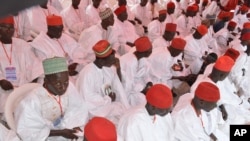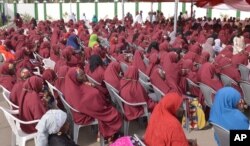Twenty-two-year-old Inuwa Inuwa and his 16-year-old girlfriend Kaishia Yunusa are in love.
“I met him three years ago when I was 13. Other suitors were coming, but I fell in love with him and now he is the only one,” says Kaishia.
“I liked her because she is very kind and she has a very good upbringing. She upholds the teachings of Islam,” Inuwa says.
Both are from agrarian families in a rural community in Kano state in northern Nigeria. They were supposed to be married last Saturday, but the event was cancelled.
Their families had prepared a wedding banquet. A goat had been slaughtered. Chicken had begun roasting. Bags of rice had been purchased.
“I had already invited my friends and many of them have come from far away places, only to come to Kano to hear that the wedding will not be taking place,” says Inuwa.
About 100 couples were supposed to get married there in a single ceremony organized by a state senator. But political tensions between the state governor and the senator resulted in the event being indefinitely postponed.
To re-enforce the decision, the state police department said it received intelligence that the mass wedding could be a security threat.
Thousands of people were expected to attend, including five governors from other states, according to the organizers.
More than 4,000 women have gotten married in the mass wedding program over the past four years. The government pays all the wedding costs - the venue, traditional bridal gifts, the dowry, food for the guests, furniture for the matrimonial home and even some starter cash for the couple.
The state governor’s administration says it will try to organize a mass wedding as soon as possible. The Sharia board says 10,000 women have already registered. The Sharia board plays a central role as a matchmaker and wedding coordinator. A single man or woman can come to the Sharia board office and look through stacks of photos to find an attractive person. Or a couple who cannot afford a wedding can come to the Sharia board to register to get married.
The Sharia board ensures that the couples are medically screened. Before the mass weddings, health screenings for potential couples was not common.
“It was even considered un-Islamic,” says Bichi. “But the mass wedding program has changed all that. Even wedding certificates, before, there was hardly any such thing like marriage certificate, but under the mass wedding program, couples are given a marriage certificate, which is actually an important document.”
Abubukar Jiddere, a political scientist with the Aminu Kano Center for Democratic Research and Training, says the wedding program benefits the entire society and enhances a woman’s social status.
“It is essentially meant to promote gender equity by providing sustainable lifestyles for the women,” Jiddere says.
A sustainable lifestyle basically means getting married and staying married. But many divorce.
“It’s becoming a real societal problem because in a predominantly Muslim society, women are not left like that. From the beginning to the end of women, they are supposed to be under a guidance or a protection,” explains Jiddere.
That protection is supposed to come from a man, in the form of her father, then her husband, then her son once the woman becomes old. But in Kano, many young girls are alone.
Nigeria’s population boom has strained the economy, so many families pressure their daughters into earlier marriage. But many newlyweds find they are incompatible and cannot cope with the financial responsibilities involved in a marriage.
In Kano state, there are divorced women as young as 14 or 15. Many people are alarmed by the apparent rise in the divorce rate.
“It’s high, that I know and that is causing women a lot of problems,” says Zubaida Nagee, a local women’s activist working with a nongovernmental organization. “Because a girl gets married and in the next three months, it’s finished. It’s all over.”
The mass wedding program makes it difficult for couples to get divorced. They must bring marital disputes to the Sharia police and a man married in the program must pay a fine of 250,000 Naira (more than $600) to divorce, Sufi says.
Nagee believes the real problem is a lack of education and poverty.
“There are better ways of taking care of women. For the government to come up with mass wedding, it is only a short term solution to the problem,” Nagee says. “You are creating more problems for the women because they’re going to have babies and they will be more in number because they will have more mouths to feed and they have no means of livelihood. Women who jump up at this opportunity are desperate.
Yaishia and Inuwa admit they were desperate. Yaishia is the sixth of 10 children and did not finish primary school.
Inuwa has a job as a driver. He says he can now afford to take care of a wife, but as for a wedding, he will accept any offer for an all-expenses paid wedding.





